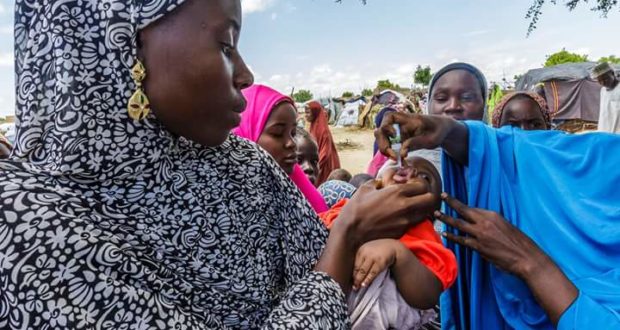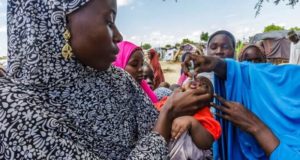News
World Immunisation Week: Nigeria Receives Most Vaccine Dosage

As UNICEF Vaccinates Half Of WorldAs the 2017 World Immunisation Week (WIW) progresses, the United Nations International Children’s Emergency Fund (UNICEF) has revealed that Nigeria received more doses of vaccines than any other country of the world.
This is even as the UNICEF has disclosed that it has reached almost half of the world’s children under the age of five with the life-saving vaccine.
Nigeria is one of the three remaining polio-endemic countries, with Pakistan and Afghanistan making up this category.
Nigeria procured 450 million doses of vaccines, 55 million more than what Pakistan procured.
“Nigeria, Pakistan and Afghanistan, the three remaining polio-endemic countries, each received more doses of vaccines than any other country, with almost 450 million doses of vaccines procured to children in Nigeria, 395 million in Pakistan and over 150 million in Afghanistan,” UNICEF said in a statement on Tuesday.
The 2017 World Immunisation Week runs from April 24 to 28, 2017.
UNICEF said that it is already the largest buyer of vaccines for children in the world, having reached nearly 100 countries in 2016.
“UNICEF procured 2.5 billion doses of vaccines to children in nearly 100 countries in 2016, reaching almost half of the world’s children under the age of five. The figures, released during World Immunisation Week, make UNICEF the largest buyer of vaccines for children in the world.
“UNICEF is the lead procurement agency for the Global Polio Eradication Initiative,” it added.
Despite the progress made so far, millions of children still miss out on the life-saving immunisation.
“Access to immunisation has led to a dramatic decrease in deaths of children under five from vaccine-preventable diseases, and has brought the world closer to eradicating polio.
“Between 2000 and 2015, under five deaths due to measles declined by 85 percent and those due to neonatal tetanus by 83 percent. A proportion of the 47 percent reduction in pneumonia deaths and 57 percent reduction in diarrhea deaths in this time is also attributed to vaccines.
“Yet, an estimated 19.4 million children around the world still miss out on full vaccinations every year. Around two thirds of all unvaccinated children live in conflict-affected countries,” it said.
Weak health systems, poverty and social inequities also mean that 1 in 5 children under five is still not reached with life-saving vaccines
“All children, no matter where they live or what their circumstances are, have the right to survive and thrive, safe from deadly diseases. Since 1990, immunisation has been a major reason for the substantial drop in child mortality, but despite this progress, 1.5 million children still die from vaccine preventable diseases every year,” Chief of Immunisation at UNICEF, Dr. Robin Nandy, said.
Inequalities persist between rich and poor children. In countries where 80 per cent of the world’s under-five child deaths occur, over half of the poorest children are not fully vaccinated.
Globally, the poorest children are nearly twice as likely to die before the age of five as the richest.
“In addition to children living in rural communities, where access to services is limited, more and more children living in overcrowded cities and slum dwellings are also missing out on vital vaccinations.
“Overcrowding, poverty, poor hygiene and sanitation as well as inadequate nutrition and health care increase the risk of diseases such as pneumonia, diarrhea and measles in these communities; diseases that are easily preventable with vaccines,” Nandy said.
By 2030, an estimated 1 in 4 people will live in urban poor communities, mainly in Africa and Asia.
This, according to the UNICEF, means that the focus and investment of immunisation services must be tailored to the specific needs of these communities and children.
Sundiata Post reports that UNICEF works with World Health Organisation (WHO); Gavi, the Vaccine Alliance; the Bill & Melinda Gates Foundation and others to ensure that vaccines protect all children – especially those, who are the hardest to reach and the most vulnerable.
-

 Opinion4 days ago
Opinion4 days agoThe Clout-chasing Dipo Awojide By Comrade Da’Peace
-

 News3 days ago
News3 days agoRamadan, Lent: Shettima Calls For National Unity And Compassion
-

 Opinion3 days ago
Opinion3 days agoReinventing Osun’s Economy Through Dagbolu Intl. Trade Centre: From Quiet Market Lessons To Regional Trade Revolution By Adeboye Adebayo
-

 News5 days ago
News5 days ago2026: Let’s Work Hand In Hand To Ensure Party’s Victory, APC Igbimo-Agba Osun Urges Ex-guber Aspirants, Party Members



